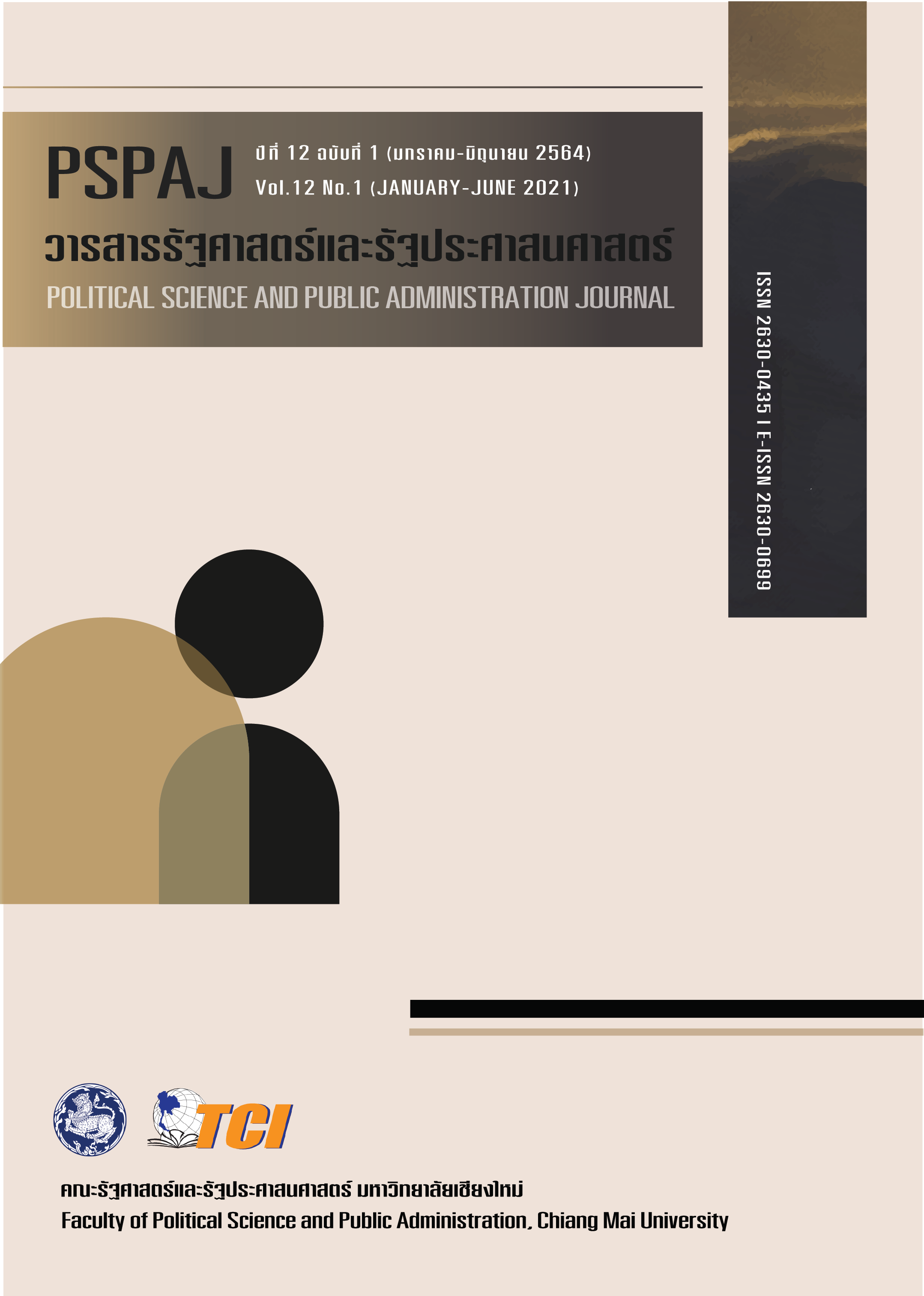รูปแบบการบริหารจัดการขององค์กรปกครองส่วนท้องถิ่นในการพัฒนาระบบเศรษฐกิจชุมชนเขตกึ่งเมือง
Main Article Content
บทคัดย่อ
การวิจัยครั้งนี้มีวัตถุประสงค์ในการวิจัย 4 ข้อ คือ ศึกษาพัฒนาการและสถานการณ์ของระบบเศรษฐกิจชุมชน ความสัมพันธ์ขององค์ประกอบในระบบเศรษฐกิจชุมชน พัฒนารูปแบบการพัฒนาระบบเศรษฐกิจชุมชนเขตกึ่งเมืองของตำบลดอนแก้ว และพัฒนารูปแบบการบริหารจัดการขององค์การบริหารส่วนตำบลดอนแก้ว โดยงานวิจัยนี้เป็นการวิจัยเชิงคุณภาพ ซึ่งมีผลการศึกษาดังนี้ (1) พัฒนาการของระบบเศรษฐกิจชุมชน สามารถจัดได้ 4 ระยะที่มีทั้งความเกี่ยวพันต่อเนื่องกันและความไม่ต่อเนื่องกัน คือ ระยะเศรษฐกิจพึ่งกัน เศรษฐกิจพึ่งตน พัฒนาเศรษฐกิจ และเศรษฐกิจเกื้อกูล (2) องค์ประกอบในระบบเศรษฐกิจชุมชน ได้แก่ กลุ่ม-องค์กรชุมชนทางเศรษฐกิจชุมชน กิจกรรมชุมชน ทุนชุมชน องค์การบริหารส่วนตำบล และหน่วยงานที่เกี่ยวข้อง (3) รูปแบบการพัฒนาระบบเศรษฐกิจชุมชนของตำบลดอนแก้ว มีแนวทางในการพัฒนาคือ มีหน่วยจัดการกลาง จัดการข้อมูล จัดการความรู้และวิจัย สร้างระบบข้อมูล ความรู้ พื้นที่-ช่องทาง และเครือข่าย เกิดการเพิ่มกิจกรรมขยายสมาชิก กลุ่ม-องค์กรใหม่ ระบบเศรษฐกิจเกื้อกูล และชุมชนพึ่งพาตนเอง (4) รูปแบบการบริหารจัดการขององค์การบริหารส่วนตำบลดอนแก้ว ใช้รูปแบบทำน้อย-หนุนมาก-ร่วมทุกกิจกรรม คือ ทำการพัฒนาบุคลากร และโครงสร้างทางกายภาพ ร่วมเป็นคณะทำงานดำเนินงาน ทำข้อตกลง และกองทุนชุมชน หนุนเสริมโครงการ พัฒนาผู้นำ บุคลากร ประสานงาน เครื่องมือ-อุปกรณ์ และกฎระเบียบ-ความเชื่อมั่น
Downloads
Article Details
- เนื้อหาและข้อมูลที่ลงตีพิมพ์ในวารสารรัฐศาสตร์และรัฐประศาสนศาสตร์ถือเป็นข้อคิดเห็นและความรับผิดชอบของผู้เขียนบทความโดยตรง ซึ่งกองบรรณาธิการวารสารรัฐศาสตร์และรัฐประศาสนศาสตร์ ไม่จำเป็นต้องเห็นด้วย หรือร่วมรับผิดชอบใดๆ
- บทความและข้อมูล ที่ได้รับการตีพิมพ์ในวารสารรัฐศาสตร์และรัฐประศาสนศาสตร์ ถือเป็นลิขสิทธิ์ของวารสาร หากบุคคลหรือหน่วยงานใดต้องการนำข้อมูลไปใช้ประโยชน์ในทางวิชาการ ขอให้อ้างอิงแหล่งที่มาด้วย
เอกสารอ้างอิง
กระทรวงทรัพยากรธรรมชาติและสิ่งแวดล้อม. (2556). ความรู้เบื้องต้นเกี่ยวกับการพัฒนาที่ยั่งยืน. กรุงเทพฯ: บริษัท อมรินทร์พริ้นติ้งแอนด์พับลิซซิ่ง จำกัด (มหาชน).
โกวิทย์ พวงงาม. (2551). การจัดการตนเองของชุมชนและท้องถิ่น. กรุงเทพฯ: มหาวิทยาลัยธรรมศาสตร์.
ฉัตรทิพย์ นาถสุภา. (2548). แนวคิดเศรษฐกิจชุมชน ข้อเสนอทางทฤษฎีในบริบทต่างสังคม. กรุงเทพฯ: บริษัท สำนักพิมพ์สร้างสรรค์ จำกัด.
ทับทิม วงศ์ประยูร. (2542). เศรษฐศาสตร์การพัฒนาเบื้องต้น. กรุงเทพฯ: ธรรมสารการพิมพ์.
ธนากร สังเขป. (2555). การพัฒนาที่ยั่งยืน. กรุงเทพฯ: บริษัท วี.พริ้น (1991).
ธเนศ ศรีวิชัยลำพันธ์. (2556). (เอกสารคำสอน) การพัฒนาเศรษฐกิจชุมชน. คณะเศรษฐศาสตร์ มหาวิทยาลัยเชียงใหม่.
นิภาพรรณ เจนสันติกุล. (2562). การพัฒนาวิสาหกิจชุมชนพื้นที่ภาคกลางตอนล่าง 1 เพื่อยกระดับขีดความสามารถในการแข่งขันในประชาคมอาเซียน. วารสารรัฐศาสตร์และรัฐประศาสน-ศาสตร์, 10(1), 95-120.
ประเวศ วะสี. (2541). ประชาคมตำบล. กรุงเทพฯ: มติชน.
วิชิตวงศ์ ณ ป้อมเพชร. (2549). พระบาทสมเด็จพระเจ้าอยู่หัวกับปัญหาเศรษฐกิจของประเทศไทย. กรุงเทพฯ: แสงดาว.
วีระศักดิ์ เครือเทพ, จรัส สุวรรณมาลา, ตระกูล มีชัย, วศิน โกมุท, เสาวนีย์ วิจิตรโกสุม, เอื้ออารีย์ อิ้งจะนิล, และคณะ. (2557). รายงานการศึกษาฉบับสมบูรณ์ (Final Report) โครงการศึกษาวิจัยเพื่อติดตามและประเมินผลการกระจายอำนาจของไทย. คณะรัฐศาสตร์ จุฬาลงกรณ์มหาวิทยาลัย.
สุนัย จุลพงศธร. (2550). ฉีกหน้ากากเศรษฐกิจ (โรงสี) ชุมชน. กรุงเทพฯ: สยาม.
สุพัฒนชัย โพธิ์แก้ว. (2557). การพัฒนาชนบทและเมือง. กรุงเทพฯ: บริษัท ทริปเพิ้ล เอ็ดดูเคชั่น จำกัด.
อิทธิพล มาชื่น. (2562). รูปแบบการบริหารจัดการขององค์กรปกครองส่วนท้องถิ่นในการพัฒนาระบบเศรษฐกิจชุมชนเขตกึ่งเมือง. วิทยาลัยบริหารศาสตร์ มหาวิทยาลัยแม่โจ้.
เอกสิทธิ์ มหาบุญเป็ง. (2544). กระแสหลุดในสายตาทุนนิยม. กรุงเทพฯ: มหาวิทยาลัยธรรมศาสตร์.
Blair, J. J., & Carroll, M. C. (2009). Local Economic Development Analysis Practices and Globalization. Thousand Oaks California: SAGE Publication Inc.
Cooke, P., & Lazzeretti, L. (2008). Creative Cities Cultural Clusters and Local Economic Development. Massachusetts USA: Edward Elger Publishing, Inc.
Leibh, N. G., & Blakely, E. J. (2013). Planning Local Economic Development: Theory and Practice. Samsung Hub Singapore: SAGE Publication Asia-Pacific Pte.


